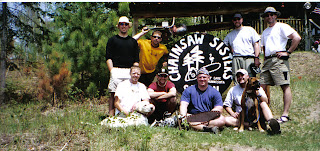The
Strib has a piece this morning with the headline "GOP has the edge at start of final week".
Call me a pessimist, but I doubt this is the "final week".
The headline and the story itself force me to question whether or not the GOP truly has the edge or not.
Back in November Minnesota's voters sent a resounding message to our elected officials. It led to the political tsunami that elected strong DFL majorities in both the House and the Senate.
Some have been listening to the concerns of the majority of Minnesotans.
No one campaigns on tax increases. I was asked this question at several forums across our district. At that time, I honestly stated that I saw no real need to raise taxes but thought we could generate more revenue for the state by taxing the highest income earning Minnesota's at a higher rate, depending on revenue forecasts and the expense of responding to the concerns of constituents.
In reality, less than 1/2 of 1 percent of Minnesotans would be asked to pay a higher tax.
It may be 6 months since the election and it would appear as some down in St Paul and the Startribune, have forgotten the core issues at hand.
Property tax increases have squeezed working and middle class Minnesotans.
Access to affordable and quality health care squeezes these same families tighter and tighter. While most Minnesotans are insured, the vast majority are also under-insured.
Because of high property taxes, school operating levies are failing at more and more schools across Greater Minnesota. The need for funding reform has been evident for more than a decade now, with little to no help for small districts like Atwater Cosmos Grove City and McLeod West.
Special education costs cut deeply into the General Operating Funds for these schools and others across Greater Minnesota.
Higher education tuition has skyrocketed under Governor Pawlenty and GOP rule.
Our lakes and streams are becoming more and more polluted.
Our roads are becoming more congested and falling in deep disrepair.
In response, the DFL put forth bills to begin to reverse Governor Pawlenty's damage from his "no new taxes" pledge, and someone has to help pay for it.
Despite all of these concerns, obstructionists like Tom Emmer, Marty Seifert, Ron Shimanski, Amy Koch, Bruce Anderson, Dean Urdahl, Laura Brod, Mark Olson and others have sided with the Governor and slowed any significant progress on the issues that matter most to Minnesotans.
Which leaves me to believe that no one has the advantage down in St Paul.
When this state moves towards another Special Session, voters around the state will once again be outraged. Outraged that elected leaders across both sides of the aisle have failed once again.
Failed to get their work done.
Failed to end the partisan staring contests.
Failure to solve the problems Minnesotans want solved.
I would be incredibly naive to think that the GOP would simply roll over and give Minnesotans and the DFL what they want.
Nor should they really.
Now, perhaps this has been covered on other blogs, but I have not seen it yet...so here goes.
What happened to the $300-$500 million the state could recoup by simply enforcing the tax code? I know Mike Hatch and others campaigned with this chip back the 06 election cycle.
Was this real or was this a ruse? Why hasn't anyone talked about this? Will this become a political chip in this "final week"?
If the GOP has an advantage in the "final week" it is a very slight advantage. The DFL still has a greater long term advantage though. They have produced quality legislation that does not coincide with the priorities of Governor Pawlenty and his small group of hatchet men and women.
The GOP has failed to respond to concerns around property taxes, health care, higher education, transportation, veterans issues and many others.
Until they do so, and stop protecting the top 1% while sacrificing the latter 99%, a GOP advantage may be shorter than any of us think.
